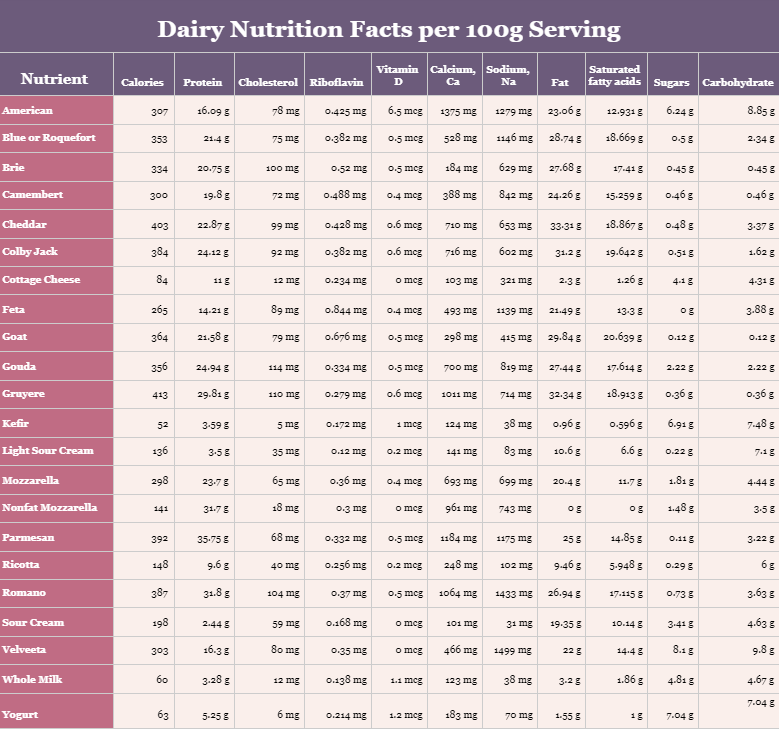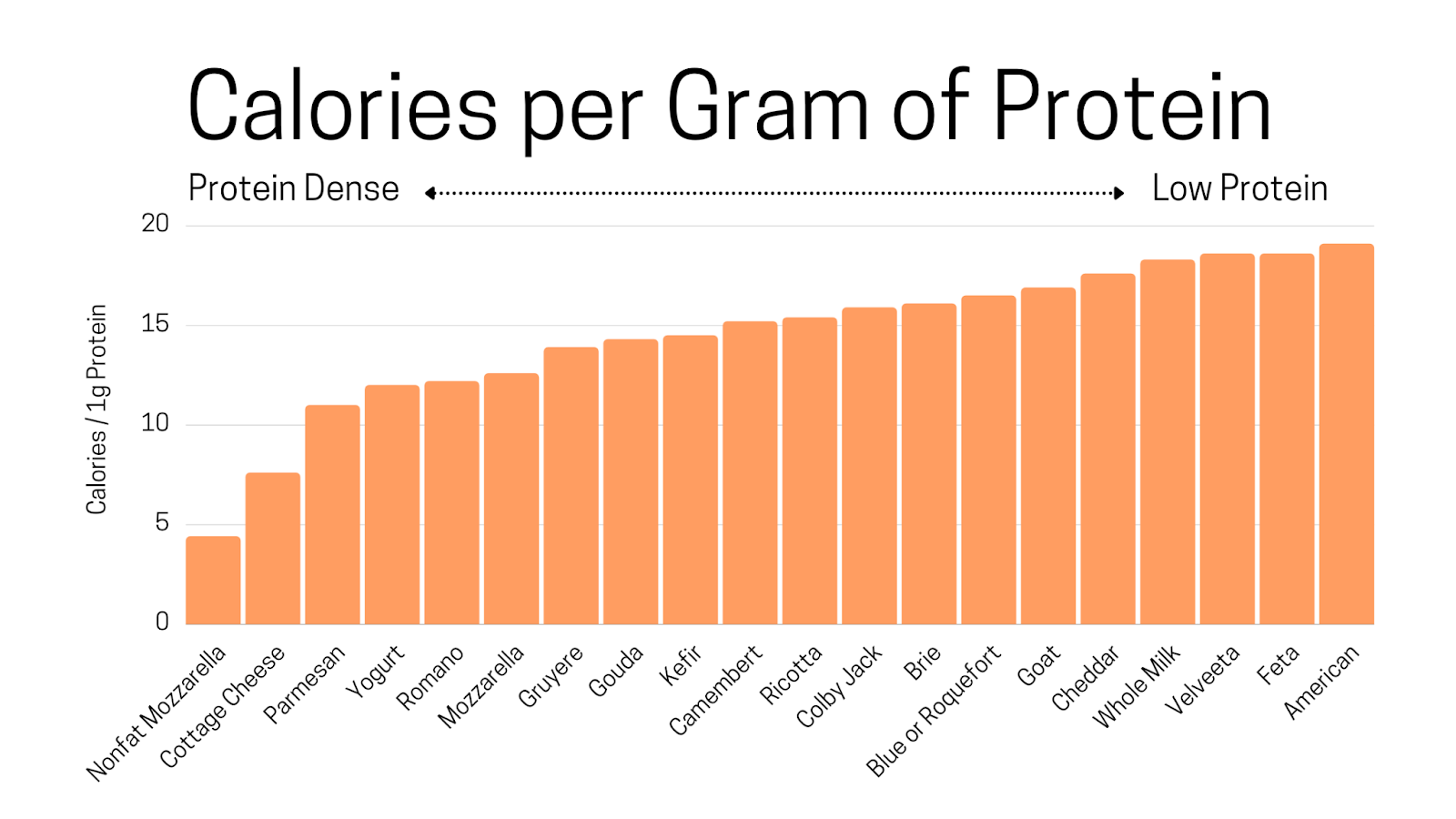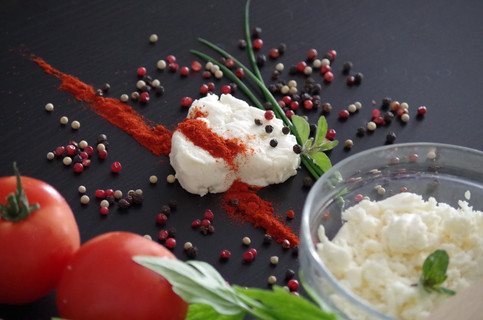Comparing Different Cheeses Nutritional Profiles
11th May 2021

Among the great variety of dairy products, some are exceptionally healthy, and others focus more exclusively on flavor. If you’re trying to be mindful of what you’re eating but don’t want to give up cheese just yet, you’re in luck! There are plenty of cheeses that can fit into nearly any diet.
The healthiness of a cheese depends on many factors, but cottage cheese and non-fat mozzarella can be considered some of the most healthy cheeses. They are great protein sources with little saturated fat. Cheddar and Gruyere cheese are of the least healthy cheeses.

Source: NutritionValue.org
Yet, there are plenty more cheeses out there. Many boast unique health benefits that may fit into your diet better than others. Different cheeses have varying abilities to support different nutritional needs, so let’s look to see which cheese is best for you.
Where does your favorite cheese stack up as a health food?
First, let’s compare the calorie contents of different cheeses.

While calorie content isn’t an absolute measure of a food’s healthiness, it is a valuable metric in determining the energy density of a food. Now, what does that mean in real terms? To put it simply, calories are your body’s fuel and translate to energy. The more calories you consume, the more fuel you have to burn and the more energy your body has.
Naturally, there are limits to this. Eating 2,000 calories of sour cream (which would be a gut-busting 2.2 lbs of sour cream) won’t fulfill all of your body’s nutritional needs and is, to say the least, highly inadvisable. Instead, use cheese and dairy as a tasty addition to meals or a snack! You can think of cheese as a more compact, dense version of milk; it has all of the nutrients with hardly any water. With water taking up less space and making up for less weight, the nutrients are more concentrated.
Kefir, yogurt, and cottage cheese are all low-calorie dairy products that contain great nutritional benefits. Kefir and yogurt are known for being probiotics that help maintain a healthy gut, and cottage cheese is a good source of protein.
It’s essential to keep in mind the context in which you are consuming calories. Just about any food will have a calorie value, but you should also consider the nutrients supplied in conjunction with those calories. For that, we’ll dive deeper.
Using cheese as a source of protein

Dairy is generally rich in protein, most of which is thanks to casein and whey. Casein and whey are remarkable proteins with numerous health benefits. Together, they can help prevent tooth decay, lower high blood pressure, lower cholesterol, support immune responses, and even inhibit the growth of cancer cells.3 For these reasons, dairy can be a great source of protein with numerous health benefits.
As you’ll notice, the chart above doesn’t simply measure protein content. It’s important to consider the other nutritional values of cheese when considering it as a source of protein. Of the cheeses listed above, parmesan has the greatest protein content by weight, with an impressive 35.75g of protein for every 100g of cheese. That much parmesan also contains 392 calories. To provide a properly weighted comparison of these cheeses, the chart measures cheese’s protein content relative to how many calories are in a 100g serving.
Nonfat mozzarella and cottage cheese are generally great options if you’re looking to add some protein to your diet. Both of these cheeses have plenty of protein to make their calories worth it. American and feta cheese, while delicious, are more in line as empty calories when it comes to protein content. An astute observer may notice that sour cream is omitted from this chart; sour cream has an extremely poor comparative protein content.
Still, be sure to consider the whole picture when looking at this comparison. Romano, for example, has a high relative protein content but is also loaded with sodium. Just 100 grams of romano contains over 1400mg of sodium, so you may want to consider another cheese as a source of protein for the sake of your kidneys. Yet, that salt content is part of what makes romano so delicious, so don’t be afraid to use it as a topping!
Cheese as a source of calcium

It’s no secret that milk is an excellent source of calcium. Cheese, being a derivative of milk, can also be a great source of calcium in your diet. First, let’s take a closer look at what calcium is and how it affects the body.
Calcium is an essential mineral needed for a variety of bodily functions. It’s an integral part of strong, healthy bones and is also necessary for nerve signal transmission. Children are often told to drink milk for strong bones, but it’s not only children that need calcium. As an essential mineral, everyone needs calcium in their diet. In addition to supporting healthy bones, calcium can reduce the risk of cardiovascular disease, lower blood pressure, and aid in weight management.
Calcium is a nutrient you can find in the form of supplements, but it’s in your best interest to get sufficient calcium through your diet. While supplements can be helpful, they are also linked to an increased chance of developing kidney stones; dietary calcium (calcium that is naturally present in the foods you consume) has no such increase.
Similar to the previous chart, this chart weights cheese’s calcium contents relative to their caloric contents. Nonfat mozzarella will yield the most calcium per calorie out of the cheeses listed in this comparison. Just 100g of nonfat mozzarella has an impressive 961mg of bone-fortifying calcium! You can make nonfat mozzarella yourself by using skim milk for the freshest, tastiest version of it. American cheese is also a good source of calcium, but other factors like its caloric density might keep you from calling it a health food. If you’re not watching your weight, you can confidently throw another slice of American cheese on your burger and say it’s for healthy bones!
Low-carb cheese options

Carbohydrates are an essential part of a healthy diet and are important for overall health. They are your body’s primary source of energy and are necessary to support an active lifestyle. But while quality carbohydrates generally are a good thing, an excessive intake of carbs can be detrimental to your health. Too many carbs can strain your body’s metabolism, potentially leading to weight gain and an increased risk of heart disease.
If you’re getting your fill of carbs elsewhere in your diet, you may be interested to see which cheeses have lower carb contents than others. Low-carb cheeses include goat, gruyere, brie, and camembert. Of these, camembert is the least calorie-dense and gruyere has the greatest protein-to-calorie ratio.
Low-fat and fat-free cheeses

Contrary to what had been believed for some years, dietary fat is an important part of a healthy diet. With that, there are different kinds of fat—some good and some bad. You should consume all fat in moderation, but take extra care with saturated fat since it’s linked to an increased risk of heart disease.
Luckily, not all cheeses are significant sources of saturated fat. Cottage cheese is an excellent low-fat option that has proven to be a nutritionally well-rounded and healthy cheese. In keeping with its namesake, nonfat mozzarella has no fat. Kefir and yogurt, while not cheeses, are additional cultured dairy products that are plenty nutritious while remaining low in saturated fat.
So, how did your favorite cheese stack up? While cheese might not be your first thought when you think about healthy foods, hopefully, you’re now able to see the potential health benefits from including cheese in your diet.
If all of this discussion about cheese has gotten you hungry, you’re in luck! You can make cheese that’s healthier
than the store-bought alternative in the comfort of your home. The CheeseMaker has all of the supplies you need to make delicious cheese of your own. See our selection of cheesemaking kits and our recipes to get you started! Don’t hesitate to contact us if you have any questions or if there’s anything we can do to help.
Sources:
- https://www.nutritionvalue.org/
- “Why Calories Count: From Science to Politics” by Marion Nestle and Malden Nesheim
- https://www.ncbi.nlm.nih.gov/pmc/articles/PMC5149046/
- https://ods.od.nih.gov/factsheets/Calcium-HealthProfessional/
- https://www.hri.org.au/health/your-health/nutrition/all-about-carbs#:~:text=Excess%20carbohydrate%20intake%20places%20a,increased%20risk%20of%20heart%20disease
- https://www.health.harvard.edu/staying-healthy/is-low-fat-or-full-fat-the-better-choice-for-dairy-products

